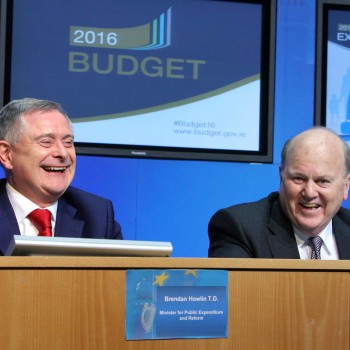Industry response to Budget 2016

A round-up of retail and industry groups' reactions to Budget 2016
14 October 2015
Budget 2016 has delivered a number of measures that will directly impact retailers.
The duty on cigarettes has gone up by 50c, bringing the average price of 20 cigarettes to €10.50. The minimum wage will also be increased from €8.65 to €9.15 an hour from 1 January.
There will also be cuts in charges to businesses who accept debit card payments, saving these businesses €36m a year. What’s more, €1.3bn is being allocated to the Department of Agriculture, Food and the Marine. The 9% VAT rate for the hospitality industry has also been retained.
Below we have rounded up the reaction to Budget 2016 by retailers and industry groups.
Retail Grocery Dairy & Allied Trades Association (RGDATA)
RGDATA, the representative association for 4,000 small shops supermarkets and convenience stores today welcomed Budget 2016 measures that will put more money in people’s pockets.
Tara Buckley, director general, RGDATA said: “The tax credit for the self employed is a step in the right direction. RGDATA has been campaigning for a long time for equal tax treatment for self-employed business owners.
RGDATA also welcomed the Minister’s announcement about charges for debit and credit card transactions. Buckley continued “These costs need to kept under close review if we want to encourage shopkeepers to accept card payments for low transactions and encourage less cash in society”.
She added: “It is regrettable that the budget hasn’t addressed the need for specific tax initiatives to assist the regeneration of rural towns and villages”.
National Federation of Retail Newsagents (NFRN) Ireland
The NFRN believes Budget 2016 has done little to address the concerns of small businesses, despite the National Federation of Retail Newsagents (NFRN) Ireland writing to the Department of Finance’s pre-budget submission to express continuing concerns about the implications of government policy for the independent retail sector.
The federation said the new measures announced have resulted in the government giving with one hand, with tax credits for the self-employed, and taking with the other hand, by increasing the minimum wage and adding 50 cent to the price of cigarettes.
Commenting on Budget 2016, NFRN Ireland district president Peter Steemers said: “While the introduction of a new €550 tax credit for the self-employed and bringing debit card fees into line with European norms are very welcome, the budget announced today has done little to allay the concerns of small business owners about where the government’s priorities lie.
Steemers also criticised the 50c hike in cigarette prices, on the grounds that it will further drive smokers towards the illegal market. He described the government’s projection of raising an extra €61.4 million from this price increase as “pure fantasy economics”.
Drinks Industry Group of Ireland
Drinks Industry Group of Ireland which represents suppliers, pubs, restaurants, hotels and independent off-licences has stated that the government’s decision not to decrease excise levels in the budget was a missed opportunity. While it welcomed the upfront excise relief for micro-breweries it said that the failure of government to reduce excise was a missed opportunity.
Peter O’Brien, Chair of DIGI said that an excise reduction would have supported consumers, jobs, growth and tourism. “We hope that the government that delivers Budget 2017 will realise the full potential of the sector and reduce the extortionate excise levels that is undermining the recovery of this industry,” O’Brien said.
Tobacco manufacturers
John Player
John Player said entrepreneurs were not the only ones incentivised in yesterday’s budget as the 50c excise increase on cigarettes will prove to be a bonanza for bootleggers. “The recent Revenue discovery of counterfeit cigarettes in Ireland, adorned with false Irish tax stamps, proves that Irish smokers are being deliberately targeted by organised crime. [This] excessive increase will further incentivise criminal elements,” John Player said in a press statement.
JTI Ireland
The dramatic 50c hike in tax on cigarettes in today’s Budget will exacerbate the illegal tobacco trade here, according to JTI Ireland. The announcement today follows a 40c increase in last year’s budget, ensuring Irish consumers continue to pay the highest prices for tobacco in the Eurozone. This latest increase comes amid exchequer losses of over €142million on tobacco excise since 2012 despite claims the excise hikes would increase the Government tax take from tobacco by €81million, leading to a shortfall of over €223million. The Minister for Finance is now predicting yesterday’s increase will bring in an additional €61.4million.
JTI Ireland general manager Igor Dzaja said: “We know that steep excise increases such as this stimulate the illegal trade.” He added: “In the last two months alone, Revenue’s efforts led to 15 seizures of smuggled cigarettes and tobacco, totalling almost 14 million cigarettes and 250kg of loose tobacco. These figures should leave nobody in any doubt that the illegal tobacco trade continues to be a serious problem in Ireland, with criminals benefitting from the State’s losses”
Property consultants CBRE Ireland
CBRE Ireland has said that cuts to the Universal Social Charge (USC) are positive as taxation cuts have the potential to stimulate further job creation, boost disposable income and in turn enhance consumer spending. In a press statement, the company said that while there were few changes announced in the Budget statement that directly affect the commercial real estate sector, nevertheless measures that benefit job creation and promote economic growth will in turn have benefits for all sectors of the property market, most notably the office, industrial, retail and investment sectors of the market. The decision to retain the 9% VAT rate in the hotels sector of the market is also welcome and will ensure that the recovery being experienced in the hotel and licensed sector of the economy will continue to materialise and become increasingly evident in all parts of the country.
CBRE said the decision to allocate additional funding towards the provision of much-needed social housing is welcome as is the allocation of funding towards the provision of 500 modular housing units to help address homelessness. However, one of the most disappointing elements of today’s Budget is the lack of immediately implementable solutions to increase housing output in the shortest possible timeframe, which have been long-promised.
Restaurants Association of Ireland
The Restaurants Association of Ireland (RAI) has said it is content about the Budget 2016 announcements. Restaurateurs welcome the retention of the 9% VAT rate. A widening of the PRSI weekly pay band has also been established, which alleviates the unbalanced cost attributed to the employer as a result of an increase in the National Minimum Wage. The RAI are also satisfied that there has been no increase in excise duty in Budget 2016.
The RAI pointed out that the success of the lower rate of VAT is evident in the 32,558 new jobs that have been created since its introduction in 2011 and in the savings of €651 million to the Exchequer in the past four years.
National Off-Licence Association (NOffLA)
The National Off-Licence Association (NOffLA) said it acknowledged the government’s decision to not increase excise duty on alcohol in Budget 2016, a move which will offer some relief to the difficulties currently being faced by the independent off-licence industry in Ireland.
Evelyn Jones, government affairs director said: “Since 2008 some 3,000 jobs (35%) have been lost in the sector and 546 Off-licences have closed reflecting the challenges facing business owners all across Ireland. While excise has not been increased in Budget 2016 it is important to note that consumers still have to pay 624% more excise on every bottle of wine purchased when compared to other EU countries. This disparity not only stifles business but limits consumer choice and discourages foreign investment in Ireland. We believe this extreme difference is unsustainable and needs to be addressed by the Government going forward.”
“Furthermore, we are calling on the government to illustrate its commitment to the health of communities all across Ireland and a ban on the below invoice cost selling of alcohol. The availability of cheap alcohol as a means to drive footfall in multiples encourages irresponsible retailing and is a threat to the broader community through alcohol abuse and anti-social behaviour. Such a ban would save the exchequer €24 million per annum.”



 Print
Print




Fans 0
Followers